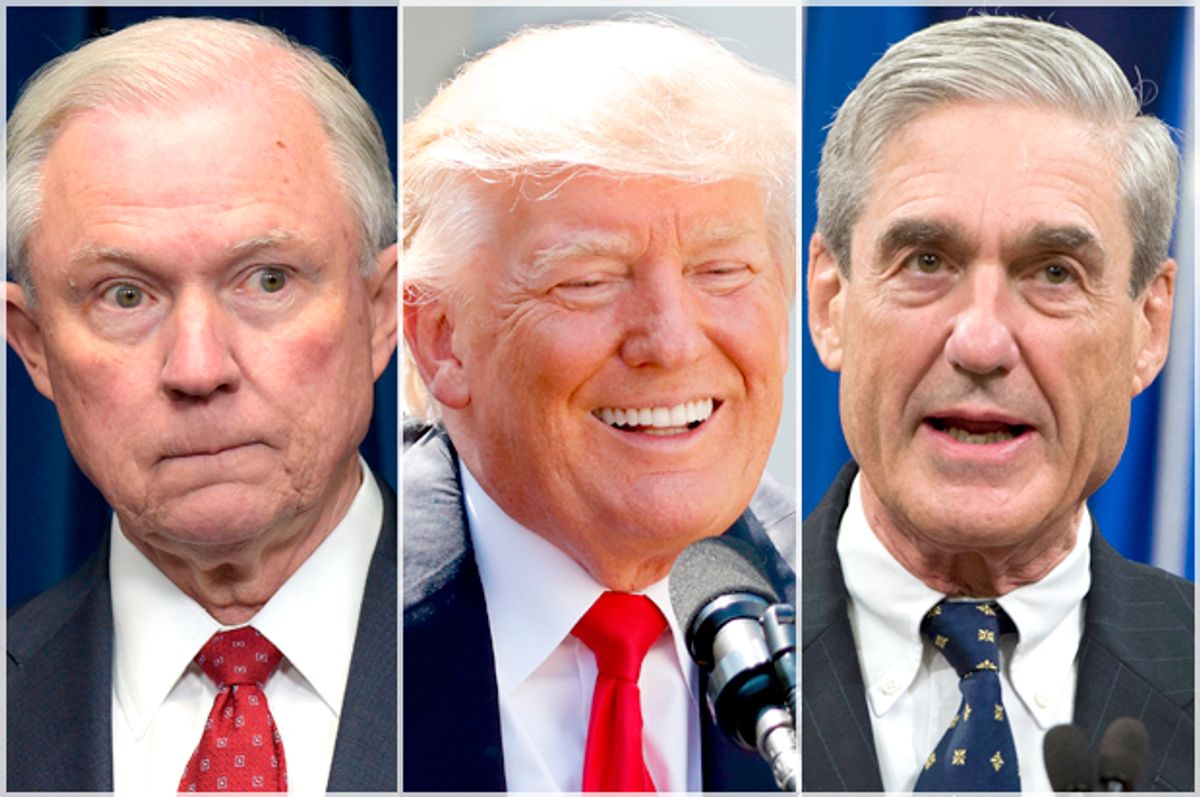If you feel as if you’re screaming into the vacuum of space regarding President Donald Trump’s desperate attempts to obstruct justice and abuse his executive power when it comes to the ongoing Trump-Russia investigation (and other things), you’re absolutely not alone. At this point, ascertaining Trump’s guilt in this entire enterprise doesn’t really require any of the bombshell news articles that have dropped over the past 12 months. Don’t get me wrong: The reporting has been indispensable and a reassuring sign that the free press clause of the First Amendment remains robust. But his guilt can be easily and almost exclusively observed through his frenetic and easily observed struggle to kill off the investigation by firing anyone who’s linked to it.
Among those firings, we’ve already watched as Trump sacked Acting Attorney General Sally Yates, New York U.S. attorney Preet Bharara and FBI Director James Comey. The latter, Trump confessed to Lester Holt, occurred explicitly because of Trump’s obsessive pursuit to kill the probe, but the former two were obviously fired for similar reasons. Of course it was the firing of Comey that triggered Deputy Attorney General Rod Rosenstein (following Attorney General Jeff Sessions' recusal) to appoint special counsel Robert Mueller to head up the investigation.
But now Mueller is on Trump’s bloody chopping block, along with Sessions.
Let’s start with Sessions. To repeat, if you think this is all about obstructing the Trump-Russia proceedings, then we agree. It’s abundantly clear that Trump is leaning toward firing Sessions because Sessions recused himself from overseeing that investigation, thus making it impossible for Trump to order Sessions to shut down the Russia probe. (Trump apparently thinks he can order the attorney general to do things.) Even more obvious than that is the reality that Trump appears to have nominated Sessions as attorney general in the first place so he could help Trump quash the whole thing.
To put it another way, it would seem as if Sessions was appointed to help Trump obstruct justice and, ironically, he might be fired in order to achieve the same goal. How do we know this for sure? Trump told the New York Times: “Jeff Sessions takes the job, gets into the job, recuses himself, which frankly I think is very unfair to the president. ... How do you take a job and then recuse yourself? If he would have recused himself before the job, I would have said, ‘Thanks, Jeff, but I’m not going to take you.’ It’s extremely unfair — and that’s a mild word — to the president.”
It can’t get more explicit than that. If Trump had known Sessions wasn’t going to oversee the Trump-Russia probe, Trump never would have appointed him. Full stop.
Here’s yet another layer of crystal-clear obviousness: Trump has signaled that he might fire Sessions then make a recess appointment of a new attorney general. Even that suggestion indicates that Trump might be considering a replacement that even Senate Republicans would reject. I’m thinking crackpot replacements such as Fox News commentators Jeanine Pirro or Andrew Napolitano. Maybe even Chris Christie or Rudy Giuliani. The crazier and more ideological they are, the more likely they’d be to agree to swear a Trump loyalty oath that would include a promise to stymie the Trump-Russia probe.
Don’t forget: We’re not dealing with three-dimensional chess here. This is Donald Trump. He seems to think that a strategic Brundlefly gambit -- something like Sun-tzu mixed with a Scooby-Doo villain -- would be an ingenious way to circumvent justice. In reality, everything he does is telegraphed. We can see every move from a mile away, screaming its way down Pennsylvania Avenue -- nothing but hair and teeth, slashing at anything that moves.
And then there’s the Mueller situation. There’s perhaps no one in D.C. who’s more unimpeachable than Mueller and yet Trump has been endeavoring to smear him for several weeks now, softening the ground for what I believe is the inevitable firing of the special counsel. Frankly, and this might sound twisted, I would almost prefer that Trump fire Mueller, if only to supercharge the pathway toward impeachment.
Such an action would be so shocking that even some entrenched pro-Trump congressmen might flip against the president. Sen. Lindsey Graham, R-S.C., who has never been a fan, has signaled that firing Mueller would be “the end of the Trump presidency.” Graham added, “If Jeff Sessions is fired, there will be holy hell to pay.”
We should certainly be rooting for a thorough and aboveboard dispensation of justice on this matter. But given the catastrophic nature of the Trump presidency, and given that Congress might well decide to reappoint Mueller as a special prosecutor, Trump firing Mueller might be the best thing the president could ever do for the nation.
Again, yes, it seems counterintuitive that firing the lead investigator who’s seeking to uncover what could be the most harrowing political scandal in U.S. history might actually help justice to be served. But that specific result is undeniable. Firing Mueller would, as Graham predicted, bring an end to Trump’s presidency. And while the investigation might be temporarily interrupted, it too would power through and eventually deliver accountability to all of the guilty participants.
Donald Trump continues to dig his own political grave. Maybe we should all just sit back and, you know, let him keep on digging.



Shares